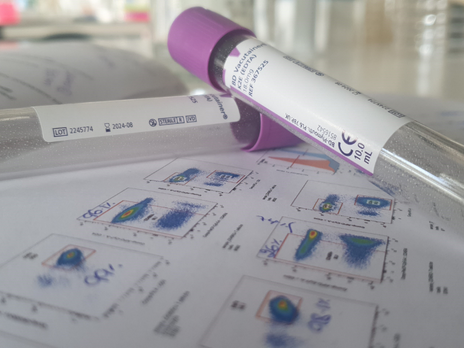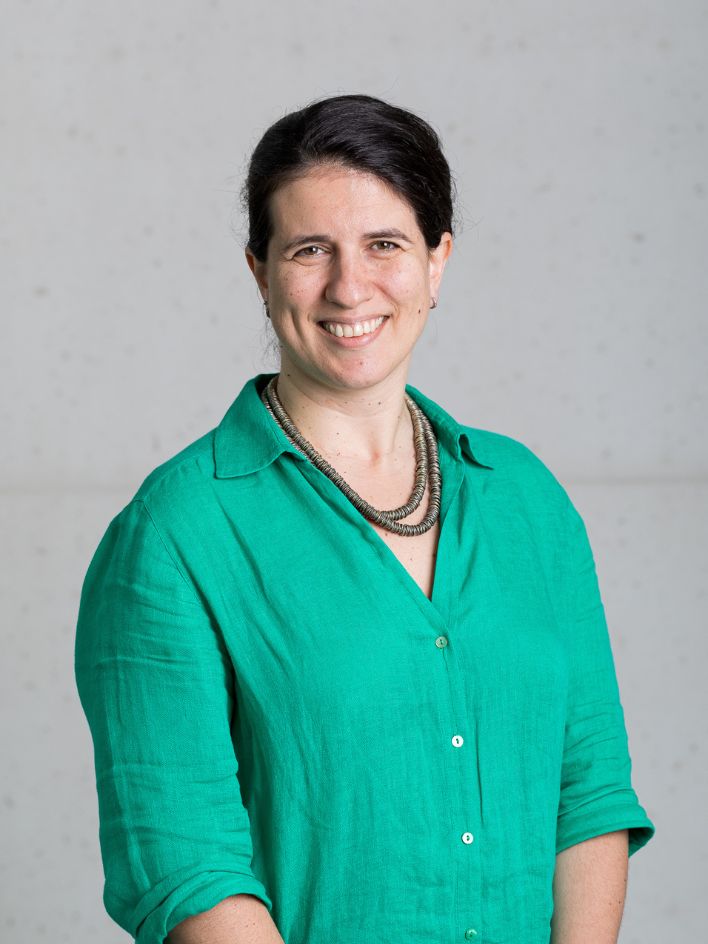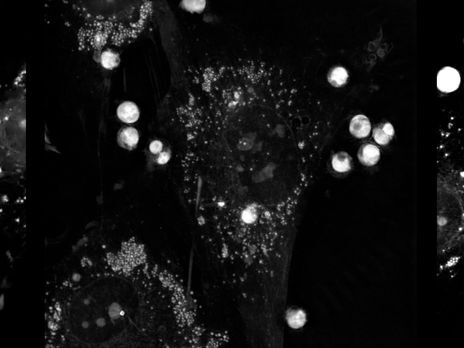
The immune system in Multiple Sclerosis
This project aims to explore the immune system on multiple sclerosis pathophysiology and is divided in 3 branches:
– Tcells@MS. Our recent studies on newly diagnoses RRMS and PPMS patients…

Claudia Nobrega research interest is related to the involvement of the immune system on multiple sclerosis (MS) pathophysiology.
Using a homogenous group of relapsing-remitting MS (RRMS) and of primary progressive MS (PPMS) patients, newly-diagnosed and treatment-naïve, Claudia and her colleagues reported that, in comparison to healthy controls, patients’ T cell phenotype in the blood tips towards a less differentiated phenotype. Following this observation, they were granted the opportunity to explore the mechanisms underlying this, and to understand how this observation can be integrated in the current model of MS pathophysiology. Additionally, and in line with the recent compelling evidence supporting that infection with the Epstein-Barr virus (EBV) precedes MS, Claudia and her colleagues are also interested in assessing the function and the T cell receptor (TCR) repertoire of EBV specific CD8+ T cells from MS vs. EBV-seroconverted controls.
Claudia completed her PhD in 2009 studying the impact of thymic infection by mycobacteria on the differentiation of new T cells. Her Post-Doc was a turning point when she embraced human studies, to complement the mouse models she had been working with so far. She followed her interest in immunology in the context of chronic diseases, namely on infections by HIV and Mycobacterium tuberculosis, and more recently on MS. In these studies, gained traction on the implementation, nurturing and organization of biobanks of human samples (serum/plasma and PBMCs), maintenance of the respective data bases and fostering interaction and collaboration with the clinicians.

Claudia Nobrega research interest is related to the involvement of the immune system on multiple sclerosis (MS) pathophysiology.
Using a homogenous group of relapsing-remitting MS (RRMS) and of primary progressive MS (PPMS) patients, newly-diagnosed and treatment-naïve, Claudia and her colleagues reported that, in comparison to healthy controls, patients’ T cell phenotype in the blood tips towards a less differentiated phenotype. Following this observation, they were granted the opportunity to explore the mechanisms underlying this, and to understand how this observation can be integrated in the current model of MS pathophysiology. Additionally, and in line with the recent compelling evidence supporting that infection with the Epstein-Barr virus (EBV) precedes MS, Claudia and her colleagues are also interested in assessing the function and the T cell receptor (TCR) repertoire of EBV specific CD8+ T cells from MS vs. EBV-seroconverted controls.
Claudia completed her PhD in 2009 studying the impact of thymic infection by mycobacteria on the differentiation of new T cells. Her Post-Doc was a turning point when she embraced human studies, to complement the mouse models she had been working with so far. She followed her interest in immunology in the context of chronic diseases, namely on infections by HIV and Mycobacterium tuberculosis, and more recently on MS. In these studies, gained traction on the implementation, nurturing and organization of biobanks of human samples (serum/plasma and PBMCs), maintenance of the respective data bases and fostering interaction and collaboration with the clinicians.
Selected Publications:
“Distinct disease-modifying therapies are associated with different blood immune cell profiles in people with relapsing-remitting multiple sclerosis”
J. Canto-Gomes, D. Boleixa, C. Teixeira, A. Martins da Silva, I. González-Suárez, J. J. Cerqueira, M. Correia-Neves and C. Nobrega
International Immunopharmacology. (2024). 131:111826
DOI: 10.1016/j.intimp.2024.111826.
“People with Primary Progressive Multiple Sclerosis have a lower number of central memory T cells and HLA-DR+ Tregs”
J. Canto-Gomes, S. da Silva-Ferreira, C. S. Silva, D. Boleixa, A. Martins da Silva, I. González-Suárez, J. J. Cerqueira, M. Correia-Neves and C. Nobrega
Cells (2023). 12(3):439
DOI: 10.3390/cells12030439
“Low memory T cells blood counts and high naïve regulatory T cells percentage at relapsing remitting multiple sclerosis diagnosis”
J. Canto-Gomes, C. S. Silva, R. Rb-Silva, D. Boleixa, A. Martins Da Silva, R. Cheynier, P. Soares Costa, I. González- Suárez, M. Correia-Neves, J. J. Cerqueira and C. Nobrega
Front. Immunol. (2022). 13: 901165
DOI: 10.3389/fimmu.2022.901165
“Performance assessment of 11 commercial serological tests for SARS-CoV-2 on hospitalized COVID-19 patients”
C. Serre-Miranda*, C. Nobrega*, S. Roque*, J. Canto-Gomes, C. S. Silva, N. Vieira, P. Barreira-Silva, P. Alves-Peixoto, J. Cotter, A. Reis, M. Formigo, H. Sarmento, O. Pires, A. Carvalho, D. Y. Petrovykh, L. Diéguez, J. C. Sousa, N. Sousa, C. Capela, J. A. Palha, P. G. Cunha, M. Correia-Neves
Int. J. Inf. Dis. (2021). 104:661
DOI: 10.1016/j.ijid.2021.01.038
“Thymic function as a predictor of immune recovery in chronically HIV-infected patients initiating antiretroviral therapy”
R. Rb-Silva, C. Nobrega, C. Azevedo, E. Athayde, J. do Canto Gomes, I. Ferreira, R. Cheynier, A. Yates, A. Horta, M. Correia-Neves
Front. Immunol. (2019). 2: 25
DOI: 10.3389/fimmu.2019.00025
Ag85-focused T-cell immune response controls Mycobacterium avium chronic infection”
B. Cerqueira-Rodrigues, A. Mendes, M. Correia-Neves, C. Nobrega
PLoS One (2018) 13(3): e0193596R.
DOI: 10.1371/journal.pone.0193596
“Toxoplasmosis-associated immune reconstitution inflammatory syndrome involving the central nervous system (CNS-IRIS): a case report with longitudinal analysis of T cell subsets”
R. Rb-Silva*, C. Nobrega*, E. Reiriz, S. Almeida, R. Sarmento-Castro, M. Correia-Neves, A. Horta
BMC Infectious Disease (2017) 17: 66
DOI: 10.1186/s12879-016-2159-x
”Longitudinal evaluation of regulatory T-cell dynamics on HIV-infected individuals during the first 2 years of therapy”
C. Nobrega, A. Horta, V. Coutinho-Teixeira, A. Martins-Ribeiro, A. Baldaia, R. Rb-Silva, C. L. Santos, R. Sarmento-Castro, M. Correia-Neves
AIDS (2016), 30: 1175-85C. 7.
DOI: 10.1097/QAD.0000000000001074
“High percentage of regulatory CD4+ T cells associates with worse immune reconstitution in HIV-infected patients”
A. Horta*, C. Nobrega*, P. Amorim-Machado, V. Coutinho-Teixeira, P. Barreira-Silva, S. Boavida, P. Costa, R. Sarmento-Castro, A. Gil Castro, M. Correia-Neves
PLoS One (2013) 8(2): e57336.
DOI: 10.1371/journal.pone.0057336
“Tolerance has its limits: how the thymus copes with infection”
C. Nunes-Alves, C. Nobrega, S.M. Behar, M. Correia-Neves
Trends in immunology (2013) 34(10):502-510
DOI: 10.1016/j.it.2013.06.004
Ongoing Funded Projects
2023-Present (Principal Investigator), “Tcells@MS-Why are peripheral T cells less mature at Multiple Sclerosis clinical onset?”, Life and Health Sciences Research Institute (ICVS) University of Minho, Braga, Portugal; Funder: Fundação para a Ciência e a Tecnologia (FCT), Portugal.
DOI: https://doi.org/10.54499/2022.05294.PTDC

This project aims to explore the immune system on multiple sclerosis pathophysiology and is divided in 3 branches:
– Tcells@MS. Our recent studies on newly diagnoses RRMS and PPMS patients…

Glioblastoma (GBM) is a notoriously devastating malignant brain tumor, presenting remarkable intratumor heterogeneity. Despite aggressive treatments, it is universally fatal, with a median patient survival of…

Epstein-Barr virus (EBV) infection is a major risk factor for developing multiple sclerosis (MS). In this study, we will investigate, in people with MS, a specific type of immune cell called CD8+ T lymphocytes, which are essential for controlling viral infections, including EBV.

This project builds on previous findings from my group that newly diagnosed, treatment-naive people with multiple sclerosis have fewer memory T cells compared to age- and sex-matched healthy controls.



Phone: +351 253 604 967
Fax: +351 253 604 809
Email: icvs.sec@med.uminho.pt
Life and Health Sciences
Research Institute (ICVS)
School of Medicine,
University of Minho,
Campus de Gualtar
4710-057 Braga
Portugal

Copyright ©2022 ICVS. All Rights Reserved



Copyright ©2022 ICVS. All Rights Reserved
Life and Health Sciences
Research Institute (ICVS)
School of Medicine,
University of Minho,
Campus de Gualtar
4710-057 Braga
Portugal



Copyright ©2022 ICVS. All Rights Reserved
Life and Health Sciences
Research Institute (ICVS)
School of Medicine,
University of Minho,
Campus de Gualtar
4710-057 Braga
Portugal

